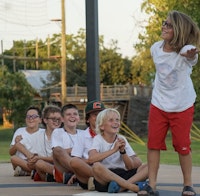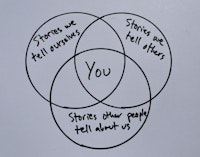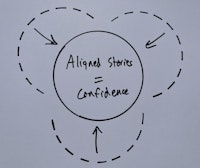Stories that build confidence
October 31, 2025

“What does it mean to be a strong person?”
I asked this to a group of teens over the summer, thinking it might start a fun discussion.
Crickets.
The question hung in the air for a looooong time.
Probably less than a minute, to be fair, but seconds tick slowly when a group is waiting for someone else to start.
Finally, one senior camper spoke up.
“I don’t know if I want to go first, but at least I know nobody here is going to put me on blast.”
We eventually had a great discussion (see below), but this pause and opening line caught my attention.
It was an example of why it’s so important to create spaces where teenagers can be comfortable being themselves.
Three Stories That Shape Us
This took place during one of our Senior Camper Talks (ask me about these if we see each other next summer). One of the concepts we talked about is worth sharing here.
There are three kinds of stories that exist in a person’s life at any given time:
- Stories we tell ourselves about ourselves
- Stories we tell other people about ourselves
- Stories other people tell about us

For most teenagers (and maybe adults, too), balancing these stories becomes an intricate dance.
Think about all the different personas a teenager has to keep up with:
The version showing up at school.
The version that goes home to family.
The version that appears on social media.
The version your peers decided you are this week.
The version you think your parents want you to be.
That seems exhausting.
When these stories don’t line up, what happens? It creates this near-constant underlying tension. Wondering which version to be in any given moment. Second-guessing. Performing rather than just being.
And worst of all, it’s easy to lose track of which story is actually true.
The senior campers I was sitting with knew exactly what I was talking about. They live this reality every day.
Constantly code-switching between different versions, trying to figure out who to be, and when (or where, or how).
And yeah, it’s scary to think about being “put on blast” if saying something out of line with whatever version might be on display in the moment.
How Camp Aligns the Stories
Camp is one of the rare places where these three stories start to line up.
For starters, you spend whole entire days with many of the same people. You’re not curating an online presence or switching personas between classes.
That alone begins to simplify things.
You’re also not scrolling through other people’s highlight reels or managing different group chats. You’re just showing up as yourself, day after day, in the same community.
And then what happens?
You get celebrated for the good stuff, called out for the things that didn’t help, and forgiven for any shortcomings. Then it’s off to have a great day at camp.
No grudges, no permanent labels, no reputation that follows you around for months.
After we established that nobody was going to be put on blast, their answers to the original question started flowing.
They said that being a strong person means:
Facing challenges head-on.
Standing by what you believe in.
Being someone others can look up to.
Recognizing flaws and improving them.
Not leaving things halfway, finishing what’s started.
These were just a few of them, and they weren’t performance answers. They were honest reflections from kids who felt comfortable enough to be real.
And the cool part: at camp, their guards come down because those three types of stories converge. Who they want to be, who they show the group, and who their peers see are all the same person.
That alignment feels like freedom.
Building confidence

We either need environments where these three stories naturally align, or we need to build the skill to align them ourselves.
Camp provides both.
At camp, that convergence happens naturally. And as it does, kids build the muscles for making it happen elsewhere.
This convergence creates a natural path for confidence. When the stories align, we know who we are showing up as because there’s nothing to juggle.
And when there’s nothing to juggle, all of our energy can go toward “I’m just going to be the best version of me today.”
That’s the kind of person who stands out.
Back at the Senior Camper Talk, after that long pause, one camper broke the ice. He decided he wasn’t going to worry about being put on blast and just answered honestly.
And everyone else followed.
That’s what happens when the stories begin to align.
You get to stop performing and start leading.
Erec Sir